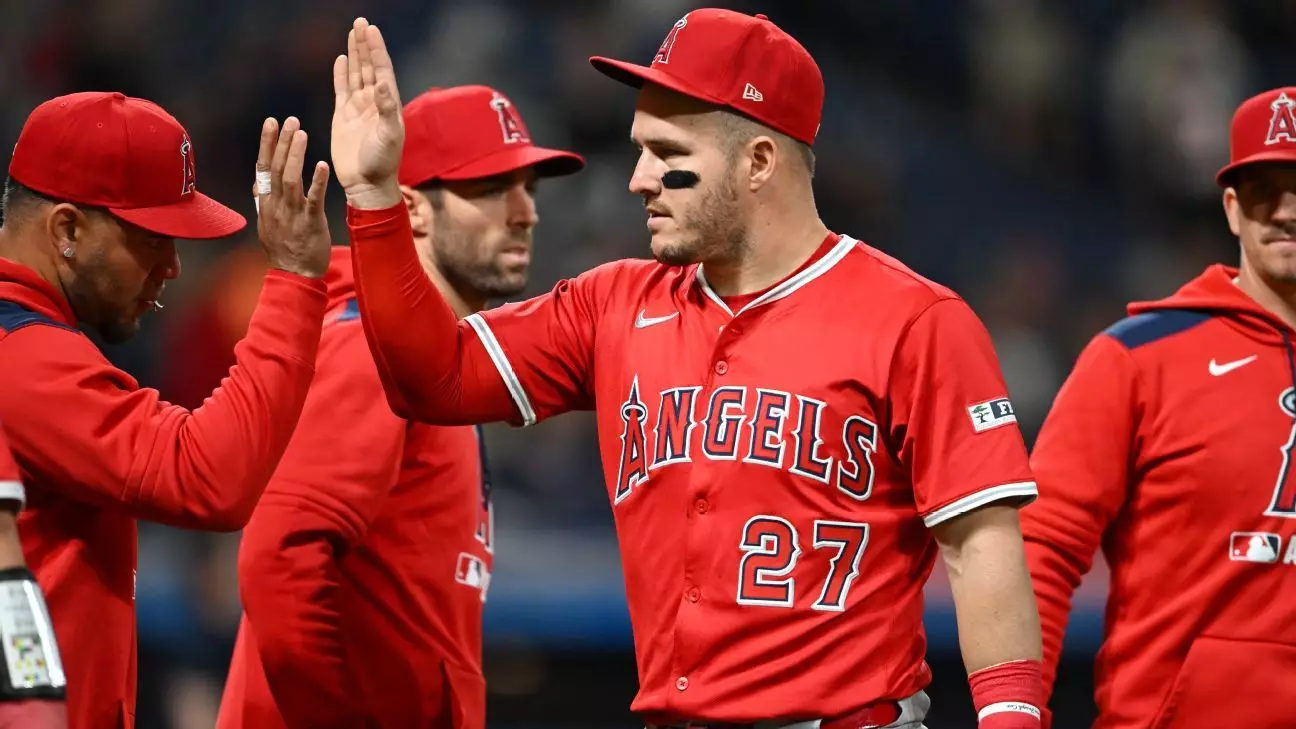Mike Trout, the Los Angeles Angels’ iconic slugger, has undoubtedly become synonymous with baseball excellence. His anticipated return from injury last Friday against the Cleveland Guardians was a pivotal moment not just for Trout, but also for a faltering Angels team. Activating a player of Trout’s caliber off the injured list inherently injects both hope and performance potential, making it an uplifting chapter in a season characterized by inconsistency. Initially scheduled to rejoin the lineup against the Boston Red Sox, his comeback was expedited, signaling the importance of his presence for a franchise in need of stability.
Despite a modest start, going 1-for-5 with a single hit, the mere sight of Trout back on the diamond serves as a reminder of past greatness and the promise of future accomplishments. His participation coincided with a much-needed win for the Angels, breaking a five-game losing streak and demonstrating that, even in his current state, Trout’s influence remains potent. As a three-time American League MVP, his ability to lead and inspire is irrefutable, regardless of batting statistics or injury history.
Facing Adversity with Determination
Trout’s journey back to the field has been arduous. Following surgery on his knee for a torn meniscus last year, the lingering effects of injury have shadowed his career, culminating in a concerning bone bruise that kept him sidelined for 26 games. The frequent interruptions to his playing time raise eyebrows about his longevity and future performance. Injuries are an unavoidable aspect of sports, particularly for an athlete who has endured 404 games lost since May 2021 alone. Each absence impacts not only his personal ambition but the team’s overall success.
That said, Trout appears to approach these challenges head-on with a mindset that potentially mirrors that of a seasoned leader. After his first game back, he acknowledged the discomfort, stating, “Bone bruises are tricky. I know I am going to be sore, but I can deal with it.” This recognition of vulnerability, combined with an unwavering commitment to the team, positions him as an embodiment of resilience. There is strength in admitting one’s limitations while simultaneously pushing toward excellence, and Trout seems to epitomize this balance.
Navigating the Lineup Reconfiguration
Another layer to Trout’s return is how it affects the Angels’ lineup dynamics. Eager for him to return to a crucial batting position, manager Ron Washington chose to place Trout fifth for his comeback game. This was not merely a strategic decision; it was a calculated risk, acknowledging that Trout may not yet be ready to shoulder the burdens of a higher lineup position. The insistence on cautious re-integration underscores a crucial point in sports: timing matters, and sometimes, stepping back can facilitate a more sustainable comeback.
Trout’s statistical performance at present stands at .180, with nine home runs and 18 RBIs across 30 games. This layer of productivity needs context—it doesn’t highlight his ability but rather the pressing question of how his game can evolve upon full recovery. His placement behind Logan O’Hoppe in the batting order means that Washington recognizes Trout’s evolving role as both mentor and protector within the lineup, an interesting juxtaposition for a player of his stature.
Optimization as the Season Progresses
While Trout’s main role for the weekend series was as the designated hitter—something he has shied away from—statistics show that he performs commendably in that capacity. With a batting average of .273 as a DH thus far, he’s demonstrated that adaptability could be crucial for his longevity. Future games against the Red Sox may uncover whether Trout can transition back into the outfield, which might demand a different level of physicality and contact with the ball—factors critical for both Trout’s health and the team’s success.
Ultimately, Trout is not just another player returning from injury; he represents the heart of the Los Angeles Angels’ aspiration to reclaim glory in the competitive landscape of Major League Baseball. His return is not just a momentary relief but could become a turning point for a team that has too often watched from the sidelines. With careful management and a focus on gradual reintegration into optimal performance modes, Trout can lead the Angels out of their current slump and back toward baseball’s elite—not merely with his bat, but with the leadership that defines true champions.

